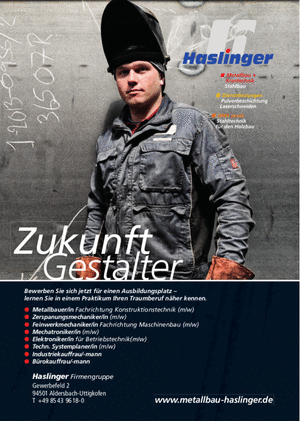
learn from the best
The Haslinger Group of Companies is amongst the most innovative steel and metal construction factories in Bavaria. We offer young people, school leavers and those moving sideways a first class, practical training and attractive development opportunities.
Training in trades
Dual training
Combination of vocational school and practical work training
Well-founded, varied training in a training workshop and in the operational manufacturing process with modern tools and machines.
- Vocational school areas Vilshofen, Passau, Deggendorf
- Block school or day school
- Duration of training: 3.5 years or 3 years
Cutting Machine Operator
Outline of job
Cutting Machine Operators produce precision metal building components by cutting processes like turning, milling, drilling or grinding. They generally work with CNC tool machines. They set these up and monitor the manufacturing process.
Cutting Machine Operators work in factories processing metal, in which components are produced through cutting processes, e.g., in machine, steel or light metal construction, in foundries, or in vehicle construction.
Overview of training:
Cutting Machine Operator is a recognized occupation requiring training under the Occupational Training Act (BBiG).
This nationally regulated 3 1/2-year training apprenticeship is offered in industry. School-based training is also possible
Cutting Machine Operator (m/f/x)
(See the training occupation video here)
Job overview
Cutting Machine Operators fabricate precision components, usually made of metal, using machining methods such as turning, milling, drilling or grinding. Usually they work with CNC machine tools. They set them up and monitor the production process.
Cutting Machine Operators work in metal processing operations where components are fabricated using machining methods, for example, in mechanical engineering, steel construction, light metal construction, foundries or vehicle construction.
Education overview
Cutting Machine Operator is recognised as an occupation that requires training according to the Vocational Training Law (BBiG).
The three and a half year training programme regulated nationwide is offered in the industry. Schooling is offered as well
Metal Constructor (Construction Technology)
Outline of job
Metal constructors in the specialist field of construction technology produce steel and metal construction, assemble and maintain them.
Metal constructors in the specialist field of construction technology work predominantly in metal construction workshops. They also find employment in factories specialising in processing metal in building and construction, in such places as roofing companies or facade constructors.
Overview of training:
Metal Constructor is a recognised occupation requiring training under the Trades Regulations (HwO).
This nationally regulated 3 1/2-year apprenticeship is offered in trades in the following specialist areas:
- Construction Technology
- Metal Design
- Commercial Vehicle Construction
Metalworker (m/f/x) ? specialisation in design engineering
(See the training occupation video here)
Job overview
Metalworkers with a specialisation in design engineering fabricate, install and maintain steel and metal structures.
Metalworkers with a specialisation in design engineering mainly work in metal construction operations. They are also employed in operations specialising in metal processing for building construction or finishing, such as roofing or the structural facings sector.
Education overview
Metalworker is recognised as an occupation that requires training according to the Handicrafts Regulation Act (HwO).
The three and a half year training programme regulated nationwide is offered in the trade with the following specialisations:
- Design engineering
- Metal design
- Commercial vehicle construction
Mechatronics Engineer
Outline of job
The job of the mechatronics engineer combines the areas of mechanics, electronics and information technology. Most appliances consist of mechanical and electronic components. Mechatronic Engineers are needed for these.
Mechatronic engineers assemble systems and machines from mechanical and electrical parts, commission them, and operate them. They also of course provide servicing and maintenance for the systems. The mechatronics engineer is thus mechanic and electronics engineer in one person.
Overview of training:
Mechatronics engineer is a recognised occupation requiring training under the Trades Regulations (HwO). This is regulated nationally through a 3 1/2-year apprenticeship.
Mechatronics Engineer (m/f/x)
(See the training occupation video here)
Job overview
The occupation of Mechatronics Engineer combines the fields of mechanics, electronics and information technology. Most systems consist of both mechanical and electronic components. This is where Mechatronics Engineers are in demand.
Mechatronics Engineers assemble systems and machines from mechanical and electronic components, commission them and operate them. Naturally they also look after the maintenance and upkeep of the systems. Thus the Mechatronics Engineer is a mechanic and an electronics engineer in one.
Education overview
Mechatronics Engineer is recognised as an occupation that requires training according to the Handicrafts Regulation Act (HwO). It is regulated nationwide with a three and a half year training programme.
Electronics Technician (M/F/X) for Production Engineering
(See the training occupation video here)
Job overview
?How does the electricity get into the outlet?? ? An Electronics Technician for Production Engineering knows exactly how to answer this question which every child has surely asked themselves. As an Electronics Technician for Production Engineering, you are found in the operation of all large industrial installations and production facilities. They need a lot of electricity for top performance ? and that's where you come in!
In training, you learn how to install electrical components such as connectors, switches or sensors as well as complete systems such as overhead cranes with the help of circuit diagrams. You also install and commission power lines. The installation of electrical drive systems and the programming of automation systems are among your tasks as well.
Education overview:
Electronics Technician is recognised as an occupation that requires training according to the Handicrafts Regulation Act (HwO).
It is regulated nationwide with a three and a half year training programme.
Technical SYSTEM PLANNER
Outline of job
Technical system planners in the specialist field of machine and system construction are involved in the development of systems, machines and vehicles. They create three-dimensional data models and technical documentation for components and assemblies.
Technical system planners in the specialist field of machine and system construction work in the development and construction department in companies in various sectors, e.g. mechanical engineering and system construction, apparatus construction and vehicle construction.
They are also employed in construction offices and by industrial service providers.
Overview of training:
Technical system planner is a recognized occupation requiring training under the Occupational Training Act (BBiG).
This nationally regulated 3 1/2-year training apprenticeship is offered in trades in the following specialist fields:
- Machine and System Construction
- Product Design and Construction
Technical System Planner (m/f/x) ? specialisation in mechanical engineering and steel construction
(See the training occupation video here)
Job overview
Technical System Planners with a specialisation in machine design and plant construction take part in the development of plants, machines and vehicles. They create three-dimensional data models and technical documentation for components and assemblies.
Technical System Planners with a specialisation in machine design and plant construction work in development and design departments of companies in various industries, such as mechanical engineering and plant construction, apparatus construction and vehicle construction.
They also work in engineering offices and for industrial service providers.
Education overview:
Technical System Planner is recognised as an occupation that requires training according to the Vocational Training Law (BBiG).
The three and a half year training programme regulated nationwide is offered in the trade with the following specialisations:
- Machine design and plant construction
- Product design and construction
Industrial Manager
Outline of job
Industrial Managers take over commercial tasks in fields such as accounting, human resource management, invoice processing, logistics, purchasing or sales. They also carry out office organisational work: They coordinate dates, prepare meetings, or process written communications.
Industrial Managers work in the administration departments of companies in all sectors of the economy.
Overview of training:
Industrial Manager is a recognized occupation requiring training under the Occupational training Act (BBiG).
This nationally regulated 3-year apprenticeship is offered in industry and commerce as well as in trades. School-based training is also possible
Industrial Management Assistants (m/f/x)
(See the training occupation video here)
Job overview
Industrial Management Assistants perform clerical tasks in areas such as bookkeeping, personnel administration, invoice processing, logistics, purchasing or sales. They also perform office organisation tasks: They coordinate appointments, prepare for meetings or handle correspondence.
Industrial Management Assistants work in the administrative departments of companies in all industry sectors.
Education overview
Industrial Management Assistant is recognised as an occupation that requires training according to the Vocational Training Law (BBiG).
The three-year training programme regulated nationwide is offered in industry, commerce and trades. Schooling is offered as well
Precision Mechanic Machine Construction Field
Outline of job
Precision mechanics manufacture precision components for machines and precision mechanical devices and assemble these into functioning units. In this, they also fit electronic measurement and control components. To do this, precision engineers often use computer-controlled tools, and sometimes also carry out the work by hand.
They plan work processes, set up tool machines and process metals with cutting processes like milling, turning, drilling and grinding. They then assess the work outcomes and check, for example, whether specified dimension tolerances have been maintained. They also assemble the manufactured machine parts and devices, install them according to their intended purpose and carry out instruction briefings. They also service and maintain precision mechanical devices.
Overview of training:
Precision Mechanic is a recognised occupation requiring training under the Occupational Training Regulations (BBiG). This is regulated nationally through a 3 1/2-year apprenticeship.
Precision Mechanic (m/f/x) ? specialisation in mechanical engineering
(See the training occupation video here)
Job overview
Precision Mechanics fabricate metal precision components for machines and precision mechanical equipment, and assemble them into functional units. They also install electronic measurement and control components. Precision Mechanics frequently use computer-controlled machine tools for this, but in part they also perform their tasks manually.
They plan workflows, set up machine tools and process metal using machining methods such as turning, milling, drilling and grinding. Then they evaluate the work results and, for example, check whether the specified dimensional tolerances are met. They also assemble the fabricated machine components and equipment, configure them according to their intended use and conduct operator training. In addition, they maintain and repair precision mechanical equipment.
Education overview:
Precision Mechanic is recognised as an occupation that requires training according to the Handicrafts Regulation Act (HwO).
It is regulated nationwide with a three and a half year training programme.

We promote engagement and qualification
Anita Pereghy
Administration
Metal Construction and Crane Technology
" I was only able to complete my training as a business economist alongside the job because I had the full financial and organisational support
from my employer."
Further training opportunities
- Technician
- Master Craftsman
- Attendance of Vocational High School (BOS)
- Acquisition of Specialist High School Diploma
- Engineering degree
Continuing education opportunities
- Technician
- Master
- Upper vocational school attendance
- Advanced technical college entrance qualification
- Academic studies
